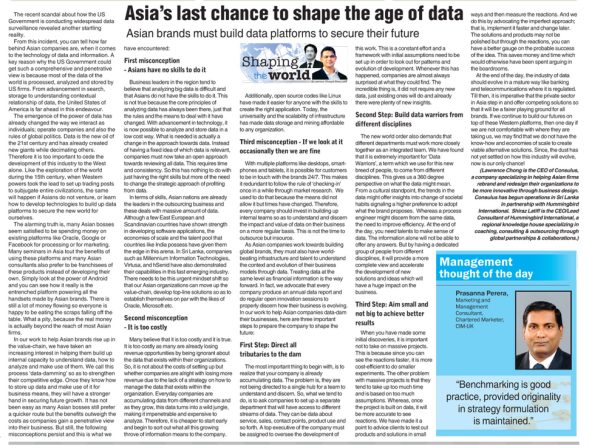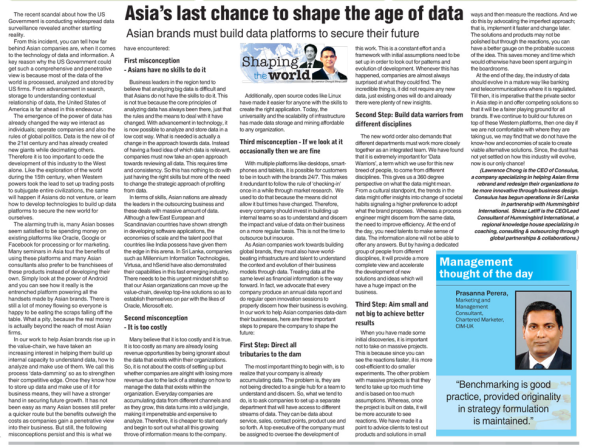(Đọc bài viết bằng tiếng Việt)
The recent scandal about how the US government is conducting widespread data surveillance revealed another startling reality. From the incident, you can tell how far behind Asian companies are, when it comes to the technology of data and information. A key reason why the US government could get such a comprehensive and penetrative view is because most of the data of the world is processed, analyzed and stored by US firms. From advancement in search, storage to understanding contextual relationship of data, the United States of America is far ahead in this endeavour.
The emergence of the power of data has already changed the way we interact as individuals, operate companies and the rules of global politics. Data is the new oil of the 21st century and has already created new giants while decimating others. Therefore, it is too important to cede the development of this industry to the West alone. Like the exploration of the world during the 15th century, when Western powers took the lead to set up trading posts to subjugate entire civilizations, the same will happen if Asians do not venture, or learn how to develop technologies to build up data platforms to secure the new world for ourselves.
The alarming truth is, many Asian bosses seem satisfied to be spending money on existing platforms like Oracle, Google or Facebook for processing or for marketing. Many seminars in Asia tout the benefits of using these platforms and many Asian consultants also prefer to be franchisees of these products instead of developing their own. Simply look at the power of Android and you can see how it really is the entrenched platform powering all the handsets made by Asian brands. There is still a lot of money flowing, so everyone is happy to be eating out of the scraps from the table. What a pity, because the real money is actually beyond the reach of most Asian firms.
In our work to help Asian brands rise up in the value-chain, we have taken an increasing interest in helping them build up internal capacity to understand data, how to analyse and make use of them. We call this process ‘data-damming’ so as to strengthen their competitive edge. Once they know how to store up data and make use of it for business means, they will have a stronger hand in securing future growth. It has not been easy as many Asian bosses still prefer a quicker route, but the benefits outweigh the costs as companies gain a penetrative view into their business. But still, the following misconceptions persist and this is what we have encountered:
1st misconception – Asians have no skills to do it
Business leaders in the region tend to believe that analysing big data is difficult and that Asians do not have the skills to do it. This is not true, because the core principles of analysing data has always been there, just that the rules and the means to deal with it have changed. With advancements in technology, it is now possible to analyse and store data in a low cost way. What is needed is actually a change in the approach towards data. Instead of having a fixed idea of which data is relevant, companies must now take an open approach towards reviewing all data. This requires time and consistency. So this has nothing to do with just having the right skills but more of the need to change the strategic approach of profiting from data.
In terms of skills, Asian nations are already the leaders in the outsourcing business and this deals with massive amounts of data. Although a few East European and Scandinavian countries have shown strength in developing software applications, the economies of scale and the talent pool that countries like India possess have given them the edge in this arena. In Sri Lanka, companies such as Millennium Information Technologies, Virtusa, hSenid have also demonstrated their capabilities in this fast emerging industry. There needs to be this urgent mindset shift so that our Asian organizations can move up the value-chain and develop top-line solutions so as to establish themselves on par with the likes of Oracle, Microsoft etc.
2nd misconception – It is too costly
Many believe that it is too costly and it is true. It is too costly as many are already losing revenue opportunities by being ignorant about the data that exists within their organisations. So, it is not about the cost of setting up but whether companies are all right with losing more revenue due to the lack of a strategy on how to manage the data that exists within the organisation. Everyday, companies are accumulating data from different channels and as they grow, this data turns into a wild jungle, making it impenetrable and expensive to analyse. Therefore, it is cheaper to start early and begin to sort out what all this growing throve of information means to the company.
Additionally, open source codes like Linux have made it easier for anyone with the skills to create the right application. Today, the universality and the scalability of infrastructure has made data storage and mining affordable to any organization.
3rd misconception – If we look at it occasionally, then we are fine
With multiple platforms like desktops, smart-phones and tablets, it is very possible for customers to be in touch with brands 24/7. This makes it redundant to follow the rule of ‘checking-in’ once in a while through market research. We used to do that because the means did not allow it, but times have changed. Therefore every company should invest in building up internal teams so as to understand and discern the impact and value of data on their business on a more regular basis. This is not the time to outsource but insource.
Seeking a strategy and a business model for breakthrough performance?
As Asian companies work towards building global brands, they must also have world-beating infrastructure and talent to understand the context and evolution of their business models through data. Treating data at the same level as financial information is the way forward. In fact, we advocate that every company produce an annual data report and do regular open innovation sessions to properly discern how their business is evolving. In our work to help Asian companies data-dam their businesses, here are 3 important steps to prepare the company to shape the future:
1st Step: Direct all tributaries to the dam
The most important thing to begin with, is to realise that your company is already accumulating data. The problem is, they are not being directed to a single hub for a team to understand and discern. So what we tend to do, is to ask companies to set up a separate department that will have access to different streams of data. They can be data about service, sales, contact points, product use etc. A top executive of the company must be assigned to oversee the development of this work. This is a constant effort and a framework with initial assumptions need to be set up in order to look out for patterns and evolution of development. Whenever this has happened, companies are almost always surprised at what they could find. The incredible thing is, it did not require any new data, just existing ones will do and already there were plenty of new insights.
2nd Step: Build Data Warriors from different disciplines
The new world order also demands that different departments must work more closely together as an integrated team. We have found that it is extremely important for ‘Data Warriors’, a term which we use for this new breed of people, to come from different disciplines. This gives us a 360 perspective on what the data might mean. From a cultural standpoint, the trends in the data might offer insights into change of societal habits signaling a higher preference to adopt what the brand proposes. Whereas a process engineer might discern from the same data, the need to improve efficiency. At the end of the day, you need talents to make sense of data. The information alone will not be able to offer any answers. But by having a dedicated group of people from different disciplines, it will provide a more complete view and accelerate the development of new solutions and ideas which will have a huge impact on the business.
3rd Step: Aim small and not big to achieve better results
When you have made some initial discoveries, it is important not to take on massive projects. This is because since you can see the reactions faster, it is more cost-efficient to do smaller experiments. The other problem with massive projects is that they tend to take up too much time and is based on too much assumptions. Whereas once the project is built on data, it will be more accurate to see reactions. We have made it a point to advise clients to test out products and solutions in small ways and then measure the reactions. And we do this by advocating the imperfect approach; that is, implement it faster then change later. The solutions and products may not be polished but through the reactions, you can have a better gauge on the probable success of the idea. This saves money and time which would otherwise have been spent arguing in the boardrooms.
At the end of the day, the industry of data should evolve in a mature way like banking and telecommunications where it is regulated. Till then, it is imperative that the private sector in Asia step in and offer competing solutions so that it will be a fairer playing ground for all brands. If we continue to build our futures on top of these western platforms, then one day if we are not comfortable with where they are taking us, we may find that we do not have the know-how and economies of scale to create viable alternative solutions. Since the dust has not yet settled on how this industry will evolve, now is our only chance!
Lawrence Chong is the CEO of Consulus, a company specializing in helping Asian firms rebrand and redesign their organizations to be more innovative through business design. Consulus has begun operations in Sri Lanka in partnership with Hummingbird International. Shiraz Latiff is the CEO/Lead Consultant of Hummingbird International, a regional knowledge house specializing in coaching, consulting & outsourcing through global partnerships & collaborations.





